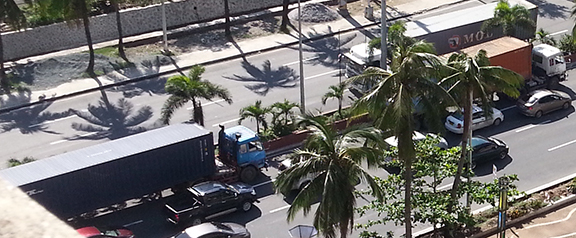 The Confederation of Truckers Association of the Philippines (CTAP) suspended its trucking holiday to give way to discussions with concerned parties on issues raised by truckers.
The Confederation of Truckers Association of the Philippines (CTAP) suspended its trucking holiday to give way to discussions with concerned parties on issues raised by truckers.
CTAP on January 16 announced to its members that the temporary suspension, which took effect immediately, was in consideration of several developments that have happened after the trucking holiday started on January 13.
The group said the suspension of the stoppage was also the condition set by International Container Terminal Services, Inc. (ICTSI) before “sitting (down) with us” to discuss truckers’ issues, which include the port operator’s one-way policy along Isla Puting Bato, implementation of Terminal Appointment Booking System (TABS), and penalties of drivers inside the Manila International Container Terminal.
CTAP said the Philippine Ports Authority (PPA) also promised to study the association’s request to exempt truckers from the requirement to secure accreditation.
Moreover, an executive of the Manila City government has verbally agreed to remove the requirement for a permit to travel and assured that trucks will be impounded for only two kinds of offenses and nothing else. These are no driver’s license and lack of official receipt/certificate of registration. Trucker Abraham Rebao was appointed CTAP representative to the Manila City government in case of problems with Manila traffic enforcers and towing companies.
READ: CTAP: Manila scraps permit to travel requirement after trucking holiday
The group said the decision to suspend was also because of the need to “calibrate our strategies in doing our constitutional right of peaceable assembly.”
On January 13 CTAP launched a trucking holiday and urged its members to stop deliveries in order to highlight the numerous issues hounding the industry, some of which have remained unresolved for years.
CTAP earlier said the trucking holiday would continue until such time that concerned government agencies and local government units (LGUs) agreed to sit down with CTAP and address these concerns.
These issues include the recent implementation of the Navotas City limited truck ban; truck bans and pass-through imposed by other LGUs; accreditation requirement of the PPA; heavy traffic in the metropolis; and alleged abusive towing operations of the Manila Traffic and Parking Bureau.
Other issues cited include the looming phase-out of trucks that are more than 15 years old; implementation of the Anti-Overloading Law; return of empty containers; delay in the return of container deposit by foreign shipping lines; and implementation of TABS in Manila’s international terminals.
CTAP noted that its Board had exerted all efforts to seek solutions to the industry’s concerns through the submission of position papers, and the holding of dialogues and meetings with government agencies, but “no concrete solutions had been realized and our proposals and concerns always [fell] on deaf ears” of the concerned agencies and entities.
The group noted that truckers have been incurring “unbearable losses” with only one or two truck trips conducted per week as opposed to the two to three trips a day in previous years. The group said the losses may prompt the closure of some trucking companies, particularly the small ones. – Roumina Pablo





